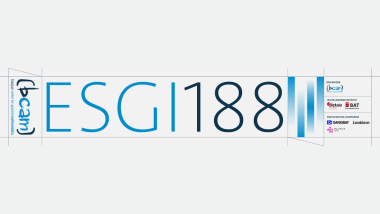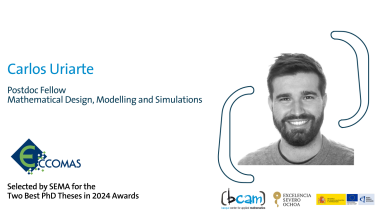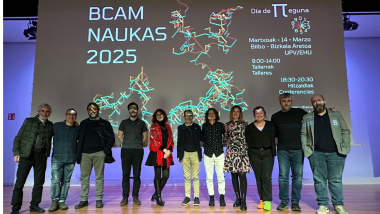Jon Ander Rivera will defend his doctoral thesis on Friday, 25th November
The defense will be held in Faculty of Science and Technology of UPV/EHU, Leioa
Jon Ander Rivera received his Bachelor’s degree in Mathematics from the University of the Basque Country (UPV/EHU) in 2017 and in 2018 he obtained his Master’s degree in Mathematical Modelling and Research, Statistics and Computing from the same university.
He joined Basque Center for Applied Mathematics – BCAM and UPV/EHU as a PhD student in 2019.
His PhD thesis, Deep Learning for Inverting Borehole Resistivity Measurements, has been supervised by Prof. David Pardo (BCAM-Ikerbasque-UPV/EHU) and Prof. Elisabete Alberdi (UPV-EHU).
The defense will be held in Adela Moyua room at Faculty of Science and Technology of UPV/EHU in Leioa. It will take place on Friday 25th November at 12:00.
On behalf of all BCAM members, we would like to wish Jon Ander the best of luck in his upcoming thesis defense.
PhD thesis Title:
Deep Learning for Inverting Borehole Resistivity Measurements
Abstract:
There exist multiple traditional methods to solve inverse problems, mainly, gradient-based or statistics-based methods. However, these methods have severe limitations. In particular, they often need to compute the forward problem hundreds of times, which is computationally expensive in three-dimensional (3D) problems.
In this dissertation, we propose the use of Deep Learning (DL) techniques to solve inverse problems. Although the training stage of a Deep Neural Network (DNN) may be time-consuming, after the network is properly trained it can forecast the solution in a fraction of a second, facilitating real-time operations. In the first part of this dissertation, we investigate appropriate loss functions to train a DNN when dealing with an inverse problem.
Additionally, to properly train a DNN that approximates the inverse solution, we require a large dataset containing the solution of the forward problem. To create such dataset, we need to solve aPartial Differential Equation (PDE) thousands of times. Building a dataset may be time-consuming, especially for two and three-dimensional problems since solving PDEs using traditional methods, such as the Finite Element Method (FEM), is computationally expensive. Thus, we want to reduce the computational cost of building the database needed to train the DNN. For this, we propose the use of rIGA methods.
In addition, we explore the possibility of using DL techniques to solve PDEs, which is the main computational bottleneck when solving inverse problems. Our main goal is to develop a fast forward simulator for solving parametric PDEs. As a first step, in this dissertation we analyze the quadrature problems that appear while solving PDEs using DNNs and propose different integration methods to overcome these limitations.
Related news
Zentroari buruz
ESGI 188 (European Study Group with Industry) Bilbon izango da 2025eko maiatzaren 26tik 30era
BCAM pertsonak




